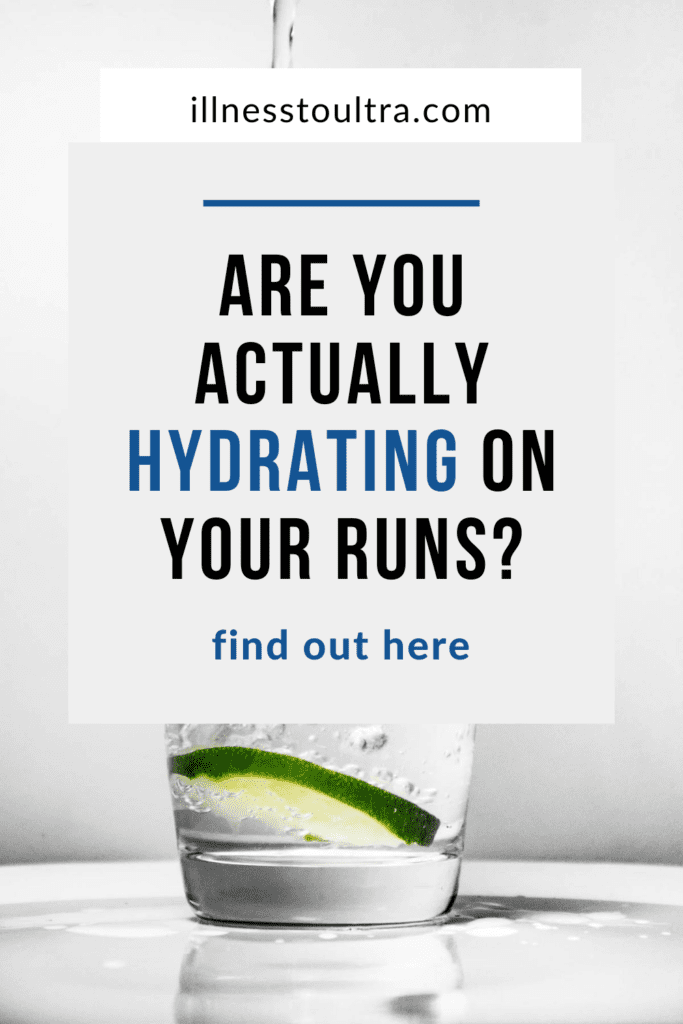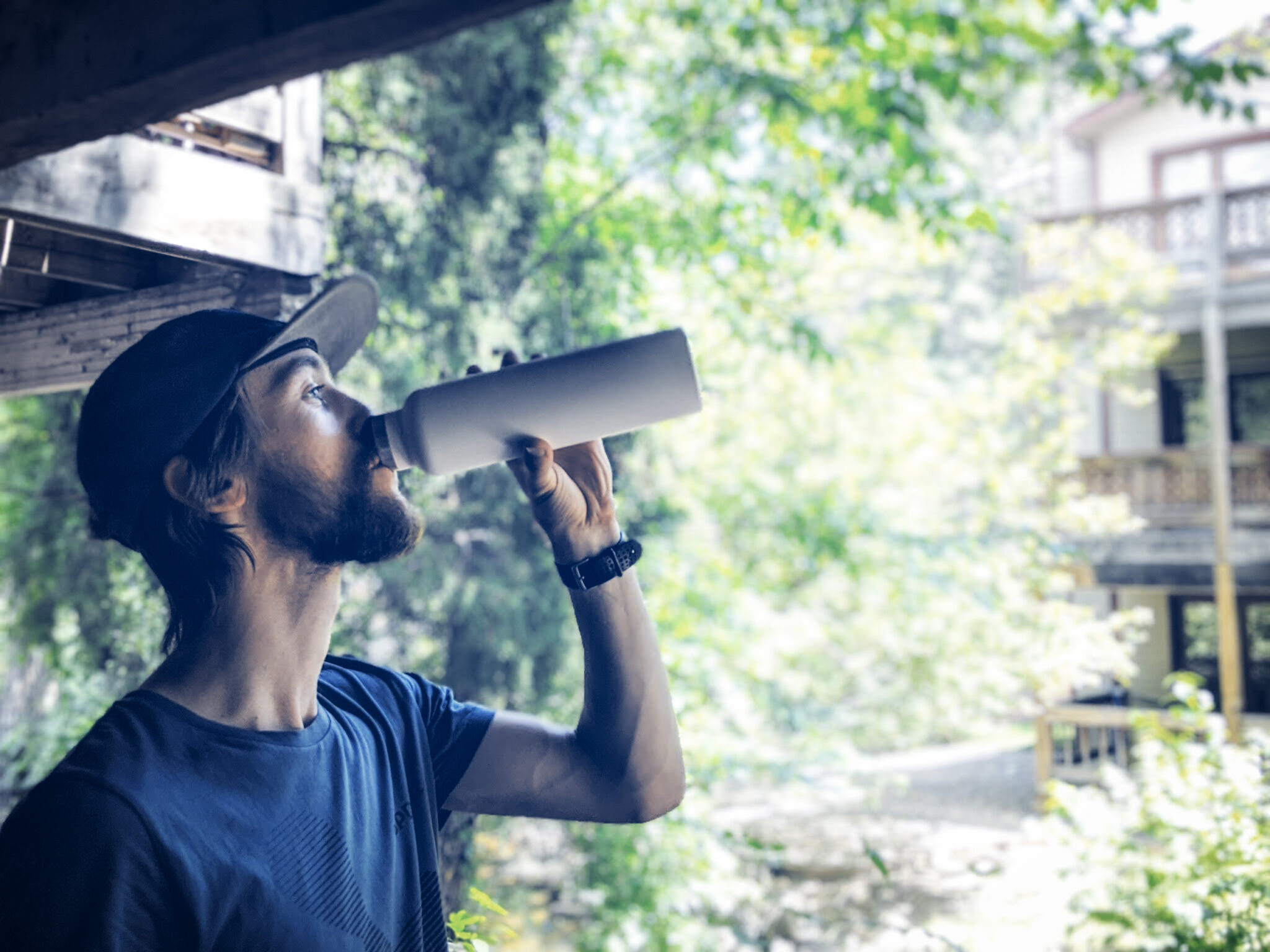What is Hydration?
We all know what hydration is. But just so we’re on the same page, hydration the process of absorbing water into the body. The body requires water for many vital functions, and we can only live a very short period without any form of fluids.
Even a 2% drop in body weight due to water loss (i.e., sweat, spitting, peeing and other bodily fluids I won’t go into) can cause a decrease in your performance. And when that number is pushed further, you’ll start seeing gut issues, and possibly nausea or vomiting.
You may think that the solution to this would be to down lots of water. Sadly it’s not that simple, and you’ll only cause yourself more problems by doing that. I’ll get into this more a little further down.
You may have heard the figures of 2 liters or 8 big glasses of water per day. These can be ok-ish guidelines for an inactive person, but we are here to talk about running (or any other similar type of consistent exercise). When you’re active in any fashion, you shed water much faster, and you have to start thinking about that water loss during your runs.
Here’s an accurate (and cheap) way to find out how much water you lose during a run:
- Weigh yourself
- Head out for an hour run.
- Weigh yourself.
Each kilogram (2.2 lbs) you lose equates to 1 liter (34oz).
With the above method, you’ll have to take note of a few variables like temperature, the speed that you ran, and how many layers of clothes are being worn. Then over time you’ll start to understand your water loss fluctuations when you run in different conditions.
For a rough (back of the bar mat) option, we can say you’ll roughly lose 1-2 liters per hour in temperatures up to 20 celsius (70 Fahrenheit) and 2-3 liters when you start pushing up and over those temperatures.
Lastly, the color of your pee is a good indication of dehydration. If you’re seeing darker yellow colors in or around the time you run, you’re most likely dehydrated.
You should be drinking more than just water to hydrate during your run. Electrolytes are vital for proper hydration as well.
Electrolytes are a mix of essential minerals that the body requires for various functions. All electrolytes are essential in your everyday life, but during exercise we mainly lose sodium and chloride through sweating.
It’s estimated that we lose anywhere between 600-1200mg of sodium for each liter of sweat. To put that in perspective, the RDA for sodium is only 1500-2300mg per day. If you’re only sticking to the RDA and running for an hour a day, you’ll become deficient in sodium pretty quickly.
Sodium deficiency is rarely talked about nowadays. This is mostly because of the demonization of salt due its link with heart disease issues. For active people, heart disease is rarely an issue, and sodium deficiency is a distinct possibility if their diet is not adequate in sodium.
Here’s a list of possible symptoms of a sodium deficiency.
- Nausea and vomiting
- Headache
- Confusion
- Loss of energy, drowsiness, and fatigue
- Restlessness and irritability
- Muscle weakness, spasms or cramps
You’ve probably felt the effects of sodium deficiency at some point during your active life. Hopefully this will help point you in the direction of your electrolyte intake!
Another neat point with sodium is that when combined or taken with water, the salt actually helps the absorption of water in the small intestine. This makes it much more likely for our bodies to make use of the water being taken in. Whereas when you drink a lot of plain water, this can have a drastically detrimental effect on your sodium levels, causing them to drop further due to frequent urination.
This will spell disaster for your next race.
Sugar! It’s also demonized in the mainstream, but like sodium, when used in the right context, it can be useful. A small amount of sugar with your water can help absorption in a similar way to sodium.
Even looking outside of the context of hydration, sugar can also be useful when you want to fuel yourself during a longer race. So, ,really you get a double whammy effect by adding something sweet into your race pack.
The question is, how much sugar?
Sugar Water in the Gut
Again this gets complicated. And we’re going to have to talk about the gut to understand why.
When water enters the digestive system, nothing much happens until it gets to the small intestine. Here is where the water has an opportunity to be absorbed into the bloodstream.
In the small intestine, fluid is absorbed into the blood by a process called osmosis. And at that point water can be distributed around the body where it is needed.
But there’s an issue when there’s too much sugar in the water. A high sugar content actually draws water out of the blood and into the small intestine, effectively dehydrating you. Then at a certain point, water will be drawn back towards the blood causing a see-saw effect. If you’ve ever felt like your tummy is turning after a sugary drink, that’s why.
Because of the dehydrating effect, we have to play a balancing act of enough sugar to provide calories for your run, and not too much to cause a stomach upset. That upper limit is somewhere around 6 grams per 100ml.
The optimal amount of sugar
Now that we know the upper limit, we can work out a safer limit of around 4 grams per 100ml, which accounts for a higher fluid intake on hot days. Meaning you’ll get 80 grams of sugar if you’re drinking 2 liters per hour.
Remember, these numbers are all guidelines. If you are not racing hard, you can lower the numbers, or if it’s a cold day, you’ll be taking in less fluid, so think about adding a little more sugar into your hydration plan.
Don’t worry; I’ll give you the cheat formula at the end of the post. 🙂

So sugars are good. Can I just drink Coke or sports drink?
Coke has just over 10g per 100ml, and many other sports drinks are similar. Since we know how and why high sugar drinks give us an upset stomach, we need to watch the ratio of sugar per fluids. The only way you could safely consume these drinks while running is by watering them down. Kind of defeats the purpose at that point, doesn’t it?
Another widely used ingredient to look out for is maltodextrin—a carbohydrate derived from grains like wheat that has a lower carbohydrate content. Unfortunately, the nutritional breakdown you see on the back of your favorite sports drink is not in the digested form. When maltodextrin breaks down in the gut, it has a similar, and in fact, worse effect than sugary drinks, possibly causing undesirable gut issues.
If you don’t believe me, go and check those sports drinks and sports gels. You may just be shocked!
I told you I’d give you a magic potion, so here we go.
Now that we know the rough ingredients and the amounts of sodium and sugar we require for a perfect race day hydrating drink, let’s put this all together.
For a liter of our special Race day drink:
Heat all the ingredients in a pan, so they all mix together and let it cool. Then you’re done.
I don’t have time for that!
If you’re not able to make your drink for any reason, I’d suggest looking into Skratch Labs. The reason I learned all this information was from a book written by one of the founders. If you want to learn more about exercise nutrition, I’d strongly recommend “The Feed Zone.”
Their product follows all the rules I set out above and is a convenient way to perfect hydration every time.
What to Eat When You Run
Eating while running? That’s crazy, right? Well, not really. That’s why I want to talk about what to eat when you run. As you build up your running distance more and more, fueling yourself with the right nutrients becomes super important.
